

SimCEO - Create your business. Manage your investments. Outperform the market. SupplyDemandlesson.pdf. Lesson-Plan-Market-Game-in-Oil.pdf. Demand and Supply Shifts Matching cards. Lesson plans. Make teaching economics more interesting and interactive for your students.
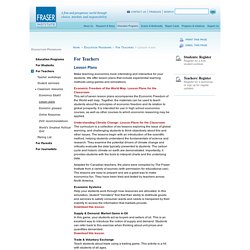
We offer lesson plans that include experiential learning methods using games and simulations. Economic Freedom of the World Map: Lesson Plans for the ClassroomThis set of seven lesson plans accompanies the Economic Freedom of the World wall map. Together, the materials can be used to teach students about the principles of economic freedom and its relation to global prosperity. It is intended for use in high school economics courses, as well as other courses to which economic reasoning may be applied. Understanding Climate Change: Lesson Plans for the ClassroomThe curriculum is a collection of six lessons exploring the issue of global warming, and challenging students to think objectively about this and other issues. Adapted for Canadian teachers, the plans were compiled by The Fraser Institute from a variety of sources (with permission for educational use). Supply & Demand FAQ.
How do economists define demand?
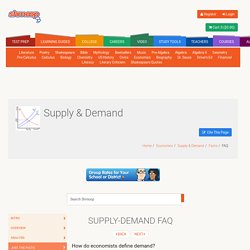
Demand refers to the amount of a good or service that people are willing and able to buy at a specified price. What is the difference between demand for a good and consumer interest in a good? For economists, consumer interest in a good is broader and less reliable than actual demand for that good. People might have a vague interest in a good but neither the ability nor the willingness to actually purchase it at a specific price. In ascertaining demand, economists are looking for more precise information.
Understanding demand. Author: Geoff Riley Last updated: Sunday 23 September, 2012 What is meant by demand?
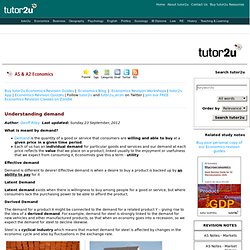
Demand is the quantity of a good or service that consumers are willing and able to buy at a given price in a given time period. Each of us has an individual demand for particular goods and services and our demand at each price reflects the value that we place on a product, linked usually to the enjoyment or usefulness that we expect from consuming it. Economists give this a term - utility Effective demand Demand is different to desire!
Latent Demand Latent demand exists when there is willingness to buy among people for a good or service, but where consumers lack the purchasing power to be able to afford the product.
Consumption: a key concept in Economics. Significance Consumption is the value of goods and services bought by people.
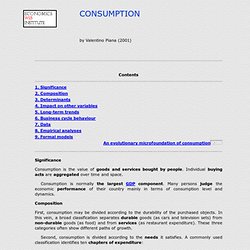
Individual buying acts are aggregated over time and space. Consumption is normally the largest GDP component. Many persons judge the economic performance of their country mainly in terms of consumption level and dynamics. Composition. Games to teach Economic Concepts. Interactive Supply and Demand 1. Interactive Supply and Demand Demand and Supply This series of step-by-step approaches looks at the concepts of supply and demand and the working of the market.
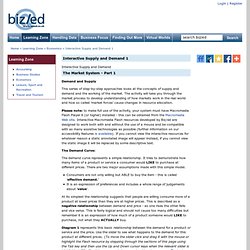
The activity will take you through the market process to develop understanding of how markets work in the real world and how so called 'market forces' cause changes in resource allocation. Please note: to make full use of the activity, your system must have Macromedia Flash Player 6 (or higher) installed - this can be obtained from the Macromedia Web site. Interactive Macromedia Flash resources developed by Biz/ed are designed to work both with and without the use of a mouse and be compatible with as many assistive technologies as possible (further information on our accessibility features is available).
The 3 Key Economic Questions.doc.
Wants and Needs Article and Activities.pdf. Economic Definitions. Political Economy is the study of how people get a living.
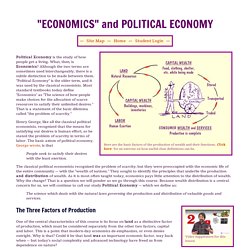
What, then, is Economics? Although the two terms are sometimes used interchangeably, there is a subtle distinction to be made between them. "Political Economy" is the older term, and it was used by the classical economists. Most standard textbooks today define "Economics" as "The science of how people make choices for the allocation of scarce resources to satisfy their unlimited desires. " That is a statement of the basic dilemma called "the problem of scarcity. " Henry George, like all the classical political economists, recognized that the means for satisfying our desires is human effort, so he stated the problem of scarcity in terms of labor. People seek to satisfy their desires with the least exertion.
Economics Online. The A-Z of Economics - introduction. Welcome to this Triple A Learning pack - the A-Z of Economics.
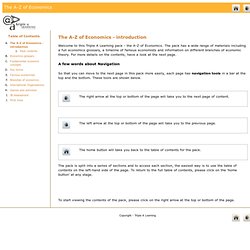
The pack has a wide range of materials including a full economics glossary, a timeline of famous economists and information on different branches of economic theory. For more details on the contents, have a look at the next page. A few words about Navigation So that you can move to the next page in this pack more easily, each page has navigation tools in a bar at the top and the bottom. These tools are shown below. Opportunity Cost Definition and Real World Examples. Revision notes for GCSE Economics. The economic problem2.wmv. News House price latest House prices up by 6.9%.
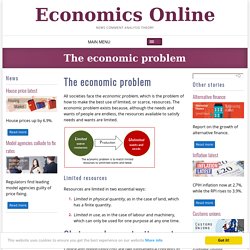
Read more Model agencies collude to fix rates Regulators find leading model agencies guilty of price fixing. Read more. Tradeoffs and Opportunity Costs. Basic economic problem 3 questions. Sectors of the Economy (Five Categories) Updated October 14, 2015.
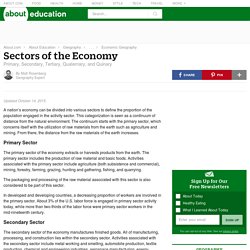
A nation’s economy can be divided into various sectors to define the proportion of the population engaged in the activity sector. This categorization is seen as a continuum of distance from the natural environment.